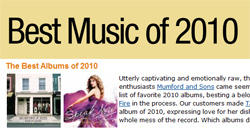Amazon.com Announces Best Music of 2010
*Amazon music editors reveal the best music of the year; Mumford & Sons, Arcade Fire are top editors’ picks; Taylor Swift and Lady Antebellum lead Customer Favorites*
SEATTLE, Dec 09, 2010 (BUSINESS WIRE) — Amazon.com, Inc. today announced its picks for best music of 2010. The list  includes the editors’ picks for the Top 100 Albums of the Year, Top 100 Customer Favorites and a breakdown of Best of the Year lists in a variety of musical genres. To see all of the Best of 2010 music lists go to www.amazon.com/bestmusic2010.
includes the editors’ picks for the Top 100 Albums of the Year, Top 100 Customer Favorites and a breakdown of Best of the Year lists in a variety of musical genres. To see all of the Best of 2010 music lists go to www.amazon.com/bestmusic2010.
“From the stunning debut of editors’ pick Broken Bells, to the triumphant return of customer favorite Eminem, we heard a lot of great music this year,” said Craig Pape, director of Music at Amazon.com. “Our Best Music of 2010 lists are designed to help customers navigate through the rich selection of releases and discover new artists they might not normally pick on their own.” (more…)



